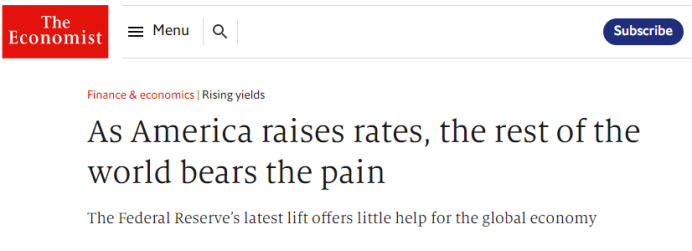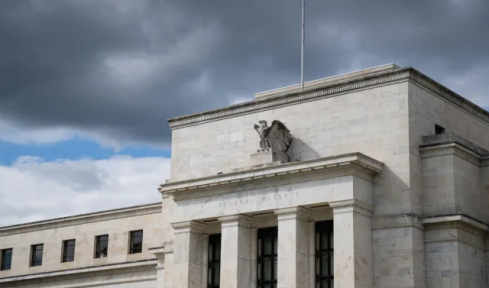The Federal Reserve raised 75 basis points again, and other economies in the world were forced to withstand bad consequences
Author:Nine Pai News Time:2022.09.22
【Source: Nine Pai News】
According to the "Economist" report, on September 21, the Fed once again announced that the federal fund interest rate target range was raised between 75 basis points to 3%and 3.25%. At the beginning of the year, a total of 300 basis points have been raised. The latest quarterly economic forecast also shows that by the end of 2023, interest rates may rise to 4.5%to 4.75%, and the unemployment rate will increase at least 0.7%. With the continuous interest rate hikes of the Federal Reserve, other global economies are also forced to follow, and the inflation problem that has been enlarged has worsened the world economy.

The US tightening monetary policy suppresses investors' risk preferences, but higher interest rates have attracted global investment and pushed the value of the US dollar. This undoubtedly helps the United States, but it will squeeze economic activities in other countries. Weaken other economies.
Since the end of August, the Fed Chairman Jerome Powell gave a speech at a Central Bank conference in Wyoming, explaining that his financial market has been severely damaged since his determination to stop inflation. In the past month alone, the value of the US dollar has risen by about 2.5%, and has risen by 16%since the beginning of the year.
It turns out that it is increasingly difficult for other economies to cope with capital to the United States due to rapid rise in interest rates. Monetary depreciation means rising import prices, intensified inflation problems, and forcing the State Bank to raise interest rates sharply. On September 20, the Swedish Central Bank raised a full percentage point of the benchmark interest rate; the market is expected to increase the key interest rates at a key interest rate of 75 basis points at a meeting on September 22 in response to the Fed in response to the Fed.

The tightening of the financial environment and the eagle policy have led to a significant increase in global bond yields. In recent days, the 10 -year Treasury bond yield in the United States has risen to more than 3.5%, back to the early 2010s. In the past month alone, Germany and South Korea's ten -year Treasury yields have risen by more than 0.6 percentage points, and Britain has risen by nearly one percentage point. After many years of interest rates fell to a historical low, the decline in currency and the surge in yields were shocking.
Of course, this is also accompanied by risks. For example, South Korea is crazy deployment of reserves to prevent the confusion of the Korean won. The government has shown its willingness to re -establish the US dollar exchange quota with the Federal Reserve. The British government announced a huge expenditure plan to protect people from the impact of rising energy prices.
Even if the worst results can be avoided, the steady rise in credit costs will cause private investment to cool down and restrain the government's hands and feet, and the government may invest more finances to boost the economy. Unfortunately, for policy makers in other places, the US economy still looks healthy, and its inflation data has always maintained a strong attitude. The Federal Reserve President Powell may therefore decide to continue to work on interest rate hikes, but the pain that affects it is suffered by other countries in the world.
Jiupai journalist Liang Xia
The copyright belongs to the original author and pays tribute to the original
- END -
Innovative achievements in the field of economics -evaluate Du Yun's "Integrated Economics"

In the practice of China's reform and opening up for more than forty years, the im...
Just now, the first passenger shipping flight was taken off from Huohu Airport in Ezhou

Jimu Journalist Huang ZhigangAt 14 o'clock on July 17th, flight CZ5680, China Sout...